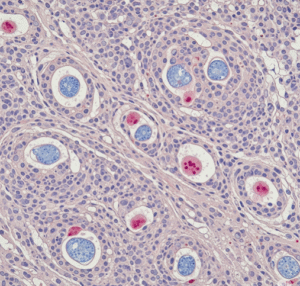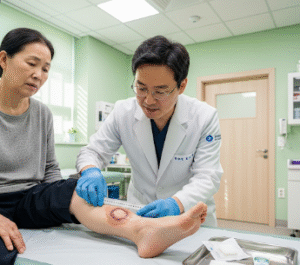Overview
Graves’ disease is an autoimmune disorder that causes the thyroid gland to overproduce hormones, leading to hyperthyroidism. It is one of the most common thyroid diseases worldwide and a significant cause of hyperthyroidism in Korea. The condition affects metabolism, heart rate, and overall body functions. With Korea’s advanced endocrinology and nuclear medicine facilities, Graves’ disease can be effectively managed with modern treatment approaches.
Symptoms
- Unexplained weight loss despite normal or increased appetite
- Rapid or irregular heartbeat (palpitations)
- Anxiety, irritability, or nervousness
- Tremors in hands or fingers
- Increased sweating and heat intolerance
- Fatigue and muscle weakness
- Swelling of the thyroid gland (goiter)
- Bulging eyes (Graves’ ophthalmopathy)
- Menstrual irregularities in women
- Sleep disturbances
Causes
Graves’ disease is an autoimmune condition where the body produces abnormal antibodies called thyroid-stimulating immunoglobulins (TSIs). These antibodies stimulate the thyroid to produce excess hormones. Triggers may include:
- Genetic predisposition
- Viral or bacterial infections
- Stress or emotional trauma
- Smoking (strongly linked to eye complications)
- Hormonal changes (more common in women)
Risk Factors
- Family history of thyroid or autoimmune diseases
- Female gender (women are 5–10 times more likely than men to develop it)
- Age between 20–40 years
- Existing autoimmune conditions (type 1 diabetes, rheumatoid arthritis)
- Smoking, especially for eye-related symptoms
- High levels of stress
Diagnosis
Doctors in Korea use a combination of clinical evaluation and advanced testing:
- Blood tests to measure thyroid hormone (T3, T4) and TSH levels
- TSI antibody test to confirm autoimmune activity
- Ultrasound to assess thyroid size and structure
- Radioactive iodine uptake (RAIU) test to measure thyroid activity
- Eye examinations in patients with bulging eyes or vision changes
Prevention
Graves’ disease cannot always be prevented, but complications and flare-ups can be minimized by:
- Avoiding smoking
- Managing stress through relaxation and lifestyle practices
- Regular thyroid check-ups, especially if there’s a family history
- Monitoring medication side effects during treatment
- Maintaining a healthy diet to support immune function
Treatment Options in Korea
Korea provides world-class treatment options for Graves’ disease, combining modern medicine with advanced technology:
- Medications
- Antithyroid drugs (methimazole, propylthiouracil) to reduce thyroid hormone production
- Beta-blockers to control rapid heartbeat and tremors
- Radioactive Iodine Therapy (RAI)
- A widely used treatment in Korea where radioactive iodine destroys overactive thyroid cells
- Offered at major hospitals such as Asan Medical Center, Samsung Medical Center, and Seoul National University Hospital
- Surgery (Thyroidectomy)
- Recommended for patients with large goiters, suspected cancer, or intolerance to other treatments
- Performed with advanced surgical techniques in Korean hospitals
- Treatment for Graves’ Ophthalmopathy
- Corticosteroids or immunosuppressive medications
- Radiation therapy or orbital decompression surgery in severe cases
- Comprehensive Care
- Endocrinology clinics in Korea offer personalized treatment, long-term monitoring, and support for lifestyle management
Prognosis
With proper treatment, most patients with Graves’ disease achieve good control of thyroid function and live healthy lives. Radioactive iodine therapy and surgery provide permanent solutions but may lead to hypothyroidism, requiring lifelong thyroid hormone replacement. In Korea, early diagnosis, cutting-edge treatments, and multidisciplinary care improve outcomes significantly, especially for patients with eye involvement or recurrent disease.













